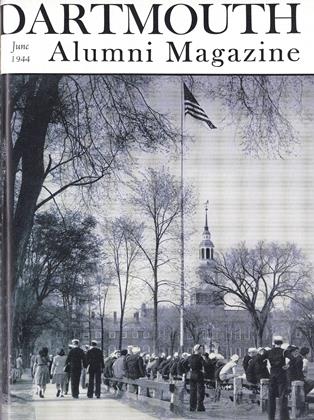When the training of the British combined-operations troops began to get a lot of publicity in this country, campuses of educational institutions all over America broke out with a rash of what were called "Commando Courses." From friends in other colleges we all got letters in which complaints about the rugged obstacle courses were impassioned and frequent. But we had none, and happily explained that Dartmouth men didn't need commando courses, or that we had other methods for building muscles. Bu tit had to come, and now it's here. Winding about Velvet Rocks, behind Chase Field, is our new obstacle course, designed by the DOC's Ross McKenney and built by him along with gangs of volunteers and trainees assigned to service, last fall and this spring. It winds up and down the mountain for about a half a mile, but the grades are so precipitous and the obstacles so frequent that during the run no one has much time for appreciation of the natural beauties of the course's situation. It has been specially constructed to provide a workout for almost every part of the body. The obstacles are made from rough-hewn logs and every opportunity to make use of the terrain has been taken. At one point in the run, the course goes directly up a rock ledge forty feet high. A couple of logs are hung along the way to help, but trainees surveying the course have estimated that this section alone will require fifteen minutes.
The course without obstacles was run in 7 minutes, and the Physical Training department thinks that about 20 minutes will be par for the course when the obstacles are all up sometime in June.
During the past few weeks trainees in basketball, boxing, and baseball classes have been marched out onto Chase Field, handed axes and hoes, and put to work on the course. They call it "Seabees" or "Concentration Camp," but agree that the job offers a good change for the season.
The course is pretty tough in spots, but it doesn't look too bad. However, it will probably be an effective sort of threat next summer, when whole dormitories might conceivably be sent over it to spruce up physically and keep things in general shipshape and seamanlike. Trainees new to the Unit, in the "basic" physical training classes, will make most use of the course, but men in the maintenance classes will be run several times a week at the discretion of their instructors.
RETIRING EDITOR of "The Undergraduate Chair," A/S Robert B. Hodes '46 leaves with the close of the present College-Navy term.
 View Full Issue
View Full Issue
More From This Issue
-
 Lettter from the Editor
Lettter from the EditorRound the Girdled Earth
June 1944 -
 Article
ArticleLaureled Sons of Dartmouth
June 1944 By H. F. W. -
 Class Notes
Class Notes1943
June 1944 By EDWIN A. BOCK, WILLIAM T. MAECK -
 Article
ArticleDARTMOUTH'S SKIPPER
June 1944 By HERBERT W. HILL -
 Class Notes
Class Notes1917
June 1944 By MOTT D. BROWN JR., DONALD BROOKS -
 Class Notes
Class Notes1918
June 1944 By ERNEST H. EARLEY, DONALD L. BARR
Robert B. Hodes '46, USNR
-
 Article
ArticleThe Undergraduate Chair
January 1944 By Robert B. Hodes '46, USNR -
 Article
ArticleThe Undergraduate Chair
March 1944 By Robert B. Hodes '46, USNR -
 Article
ArticlePARADISE FOR ESCAPISTS
March 1944 By Robert B. Hodes '46, USNR -
 Article
ArticleWINTER WEEK END
March 1944 By Robert B. Hodes '46, USNR -
 Article
ArticleFEBRUARY EXODUS
March 1944 By Robert B. Hodes '46, USNR -
 Article
ArticleThe Undergraduate Chair
June 1944 By Robert B. Hodes '46, USNR







